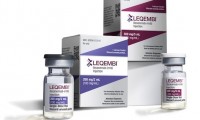-
Intercept winds down NASH programme after FDA pulls plug on Ocaliva
- Source: drugdu
- 105
- June 25, 2023
-
FDA approves Duchenne gene therapy with hefty $3.2m price tag
- Source: drugdu
- 101
- June 25, 2023
-
Calliditas files sNDA to US FDA for TARPEYO to treat primary IgAN
- Source: drugdu
- 122
- June 23, 2023
-
SFDA approves Amarin’s VASCEPA to reduce CV risk in Saudi Arabia
- Source: drugdu
- 129
- June 23, 2023
-
FDA Puts Mersana’s Ovarian Cancer Trials on Partial Clinical Hold
- Source: drugdu
- 104
- June 17, 2023
-
Blue Water Biotech shores up portfolio with purchase of six FDA-approved treatments
- Source: drugdu
- 106
- June 17, 2023
-
After Albireo buyout, Ipsen’s Bylvay picks up new FDA-approved use
- Source: drugdu
- 115
- June 15, 2023
-
Updated Covid vaccines need to target XBB omicron variants this fall, FDA staff says
- Source: drugdu
- 102
- June 14, 2023
-
Bristol Myers’ cell therapy manufacturing site in Massachusetts is good to go, FDA says
- Source: drugdu
- 110
- June 13, 2023
-
Eisai, Biogen’s Alzheimer’s disease drug Leqembi passes muster at FDA adcomm
- Source: drugdu
- 111
- June 13, 2023
your submission has already been received.
OK
Subscribe
Please enter a valid Email address!
Submit
The most relevant industry news & insight will be sent to you every two weeks.













